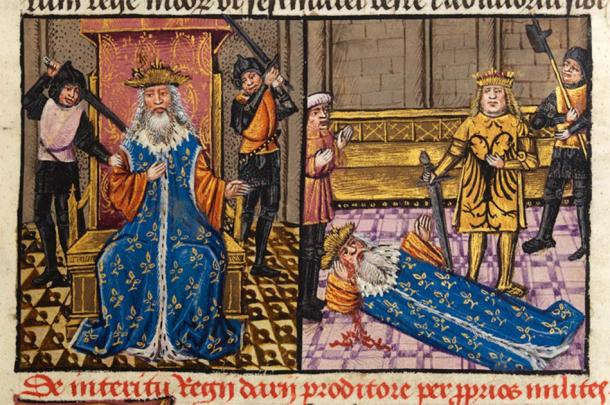Ambushes and Betrayals: 7 Assassinations that Shook the Ancient World
Throughout history, assassination has been a brutal and effective tool of power, used to eliminate rivals and shape the course of nations. From the violent coups of the ancient world to the more subtle political maneuvers of modern times, assassinations have left an indelible mark on human history. In the ancient world, where political power was often won and lost on the battlefield, assassinations were a common occurrence. In this article, we will explore ten of the most shocking assassinations of the ancient world, where kings, emperors, and leaders were cut down in the prime of their power, leaving behind a legacy of violence and intrigue. From the mysterious deaths of legendary figures to the brutal betrayals of trusted allies, these assassinations are a reminder of the dark side of human nature and the high cost of power.

The Assassination of Julius Caesar. (Public Domain)
1.Julius Caesar - Stabbed in the Back, Repeatedly
Julius Caesar, the Roman statesman and military general was born in 100 BC and assassinated on March 15th, 44 BC. His growing power and popularity among the people of Rome, combined with his unparalleled ambition, put a target on his back.
To be specific, he had royally upset much of the senatorial class, who saw him as a threat to Rome's stability. They wanted him gone and this resulted in a group of senators, led by Marcus Junius Brutus and Gaius Cassius Longinus, conspiring to assassinate Caesar in an attempt to restore the Republic to its former glory. It is believed up to 60 senators joined in the conspiracy.
On the Ides of March, 44 BC Caesar was scheduled to attend a meeting of the Senate at the Theatre of Pompey. As he entered, he was approached by several of the conspirators who pretended to petition him for the return of an exiled senator.
As they flocked around Caesar, they suddenly drew their daggers and began stabbing him. The first to strike was senator Casca, brother to the exiled senator. When Caesar evaded Casca’s first attack the other senators leaped to action, stabbing Caesar over 23 times. Suetonius, a Roman physician, later recorded that only one wound had actually been lethal.
The death of Caesar plunged Rome into a period of political chaos and civil war, as the factions that had supported him and those that opposed him struggled for power. Ultimately, however, Caesar's legacy would endure, and his name would become synonymous with ambition, power, and the fate of empires.
- Encrypted Letter of Charles V Reveals A Rumored Assassination Attempt
- Three Mysterious European Bog Body Murders
2.Philip II of Macedon - Killed at his Daughter’s Wedding
Weddings are meant to be days of celebration, but not so for Phillip II of Macedon (father to Alexander the Great), who was killed at his daughter’s wedding by one of his bodyguards. It happened in October of 336 BC while Philip was attending his daughter’s wedding at Aegae, his kingdom’s capital.
As the king was entering the town’s theater unprotected, he was suddenly attacked by Pausanias of Orestis, one of his bodyguards. The king had chosen to go unprotected in order to appear approachable before the Greek diplomats and dignitaries present at the wedding. This proved to be a slight miscalculation.
Pausanias stabbed the defenseless king in the ribs, killing him immediately. The assassin then tried to flee the scene of the crime but was pursued by three of the king’s other bodyguards. During the chase, his horse fell over some vines and Pausanias fell to the ground. The other bodyguards ensured he never got up.

Drawing by artist André Castaigne. Here Pausanias, one of King Philip’s bodyguards, stabs Philip during the procession into the theatre. (Public Domain)
The most puzzling thing about the death of Philip II is that no one is sure why he was assassinated. Some ancient historians thought that perhaps Pausanias had been offended by the king and sought revenge, some pointed the finger at Alexander and his mother. Modern historians have done a good job of poking holes in both of these theories, but are no closer to providing a good answer.
Whatever the truth, the assassination of Philip II was a major event in ancient Macedonian history. It led to a period of instability and conflict that was eventually resolved by the rise of Alexander the Great. Alexander would go on to conquer much of the known world and become one of history's most celebrated military leaders.
3.Caligula - Mourned by Pretty Much No One
Caligula was the third Roman Emperor, ruling from 37 to 41 AD. His rule is notorious for his erratic behavior, cruelty, and extravagance. He’s often referred to as Rome’s maddest ruler for a reason. Considering his legacy, it should come as no surprise that he was assassinated.
Initially, he enjoyed the support of the Roman people. Caligula was seen as a breath of fresh air after the dark and repressive rule of his predecessor, Tiberius. This didn’t last for long. Shortly into his reign Caligula showed signs of mental instability like paranoia, delusions of grandeur, and sadism.
Caligula ordered the execution of many high-profile Roman citizens, including senators and even members of his own royal family. On top of this, he enjoyed engaging in a variety of bizarre and cruel acts of public humiliation. It quickly became too much.
In 40 AD, Caligula announced that he was moving to Alexandria in Egypt where he planned on being worshiped as a god. The idea of Rome losing its emperor and therefore its political power was just too much for the senate to bear. The Praetorian Guard (usually tasked with protecting the emperor) swept into action.
Led by Cassius Chaerea (a high-profile member), the Praetorian Guard killed Caligula in 41 AD in his palace. After Caligula's death, the senate proclaimed his uncle, Claudius, as the new emperor. Claudius would go on to rule Rome for over a decade, overseeing a period of relative stability and prosperity.

The Assassination of Caligula by Lazzaro Baldi. (Public Domain)
4.Darius III - Murdered by his Allies, Respected by his Nemesis
Darius III was the last king of the Persian Achaemenid Empire, and his reign was marked by wars and conflicts with neighboring states. In 330 BC, Darius III faced a formidable adversary in the form of Alexander the Great, who had already conquered much of the Persian Empire.
The two armies met in the Battle of Gaugamela, where Alexander's smaller army emerged victorious thanks to superior tactics and cavalry. Darius III fled the battlefield and was later captured by one of his own generals, Bessus, who had ambitions of ruling the Persian Empire himself.
Bassus, aided by Nabarzanes (who was in charge of the palace guard) suggested that Darius hand over control of his army to Bassus. They promised that once Alexander was defeated, they would hand power back to the king. Darius saw through their paper-thin plan and refused.
Fearing that the Persian forces were doomed under Darius, the two conspirators turned to plan B. They bound the king and threw him in the back of an ox-cart and ordered the Persian forces to continue their fight. As Alexander and his men arrived, Barrus stabbed the king with his spear and fled, leaving him to die.

The murder of Darius by his own generals; Alexander at the side of the dying king (f. 59) (National Library of Wales/CC0)
Barrus’s rule was short-lived, and he was captured and executed by Alexander shortly afterward. Alexander was disappointed that he never got to take Darius alive. He sent the king’s body back to Persepolis, where a magnificent funeral was held. Alexander also ordered the king to be buried in the royal tombs like his ancestors. Alexander went on to marry Darius’s daughter, Stateira in 324 BC.
- Top 10 Infamous Serial Killers from Ancient History
- Prehistoric Prince Was Brutally Murdered in the Oldest Politically Motivated Assassination
5.Pompey the Great - Betrayed by Egypt
Pompey was a prominent Roman general and statesman during the late Roman Republic era. He was a member of the First Triumvirate, along with Julius Caesar and Marcus Licinius Crassus, but their alliance ultimately broke down, leading to a civil war between Pompey and Caesar.
In 48 BC, Pompey was defeated by Caesar in the Battle of Pharsalus, and he fled to Egypt seeking refuge. Pompey approached Egypt’s ruler, Ptolemy, for aid. The king responded by sending a small ship to meet Pompey, pretending he planned to meet the general with respect.
In fact, the king planned on having Pompey murdered, hoping to win Caesar’s favor. Pompey was assassinated on September 28, 48 BC, as he disembarked from his ship. He was beheaded by one of Ptolemy's soldiers, and his head was presented to Caesar as a gift.

Pompey's head was brought to Julius Caesar. (Public Domain)
Caesar was reportedly appalled by Pompey's treatment. He turned away from the man who brought him his old friend’s head and when he was given Pompey’s ring, he cried. Caesar went on to publicly mourn his former ally, and political rival’s, passing. Pompey's assassination marked the end of an era in Roman politics and the beginning of Caesar's dominance over the Roman Republic.
6.Commodus - Wrestled to Death
Anyone who has seen the film Gladiator will probably have a healthy disliking for Commodus, one of Ancient Rome’s most hated emperors (which is saying something). Commodus ruled the Roman Empire from 180 to 192 AD. His reign was known for cruelty, extravagance, and megalomania.
Commodus viewed himself as a genuine god among men. He had countless statues erected around the Empire which depicted him as Hercules. He also spent much of his time participating in gladiatorial games, which big surprise, he always won.
This led to Commodus having an antagonistic relationship with the senate, who were tired of his megalomania and wished Commodus would spend less time playing at being a gladiator (the ancient equivalent of presidents spending too much time on the golf course). Things hit a breaking point when in 191 AD Rome was ravaged by a fire that raged for several days. Many public buildings were damaged and the city needed heavy repairs.
Commodus took this opportunity to declare himself the new Romulus (Rome’s mythical founder) and ritually founded the city anew. He renamed it after himself, Colonia Lucia Annia Commodiana, and changed the 12 months of the year to all the names he had given himself over the years while he was at it.
In November 192 AD Commodus held the Plebeian Games, during which he shot hundreds of animals in the mornings and fought as a gladiator in the afternoons. It was during these games that his closest advisors decided enough was enough and decided to have him killed.
His mistress was in on the plan, having learned that Commodus planned on having her executed after the games. She poisoned his food but he simply vomited up the poison. The conspirators then approached Commodus’s wrestling partner, Narcissus, and tasked him with strangling Commodus in the bath. He readily complied.
This second attempt was successful. The Senate posthumously declared Commodus an enemy of the state and changed Rome’s name back and all the statues of Commodus were destroyed.

Detail of the Murder of Commodus by Fernand Pelez. (1879). (Public Domain)
7.Artaxerxes III - Killed by a Eunuch
Artaxerxes III served as king of the Persian Achaemenid Empire from 358 BC until his untimely death in 338 BC. He had gained the throne after overthrowing his own brother and was known as a successful military leader who had led campaigns against foreign enemies like Egypt and the Greeks.
Despite these victories, his reign was also marked by political turmoil and intrigue, particularly in his later years. One of his closest advisors was a eunuch called Bagoas. Bagoas had risen to a position of great power and influence in the Persian court through years of careful political maneuvering. He had served under several kings and was known for his cunning and ambition.
According to some accounts, Bagoas had gradually become dissatisfied with Artaxerxes III’s rule and sought to replace him but what exactly tipped him over the edge is unknown. It’s believed he had the king’s meals poisoned over time, leading him to fall ill and eventually die.
After the king’s death, Bagoas attempted to put his own candidate on the throne and had most of Artaxerxes’s sons killed to prevent them from claiming the throne. The assassination of Artaxerxes III by Bagoas is one of the most famous incidents of political intrigue in ancient Persia. It demonstrates the level of power and influence that eunuchs could wield in the Persian court, and the lengths to which some courtiers would go to achieve their own political goals.

Artaxerxes III tomb in Persepolis . (Public Domain)
Conclusion
As we reflect on these ten shocking assassinations of the ancient world, we are reminded of the fragility of power and the lengths to which people will go to obtain and maintain it. Whether through betrayal, poison, or violence, these assassinations demonstrate the dark side of humanity and the devastating consequences of political ambition.
Despite their untimely deaths, it could be said many of these assassinations were ultimately failures. In most cases, the victims' names have been remembered in the annals of history while many of the conspirators have largely been forgotten. Furthermore, these killings often led to periods of instability and those who seized power through murder and betrayal were often quickly dispatched themselves.
Top image: The ambush and assassination of Julius Caesar. Source: Justinas/Adobe Stock
References
Editor. 2023. What was the Impact of Julius Caesar’s Murder? History Today. Available here: https://www.historytoday.com/archive/head-head/what-was-impact-julius-caesars-murder
Gray. E. 2023. Pompey the Great. Encyclopedia Britannica. Available here: https://www.britannica.com/biography/Pompey-the-Great
Watts. E. 2023. A Timeline of Commodus. Getty. Available here: https://www.getty.edu/education/college/true_crime_in_ancient_times/pdf/timeline_of_commodus.pdf
Valcarel. J. 2020. This Roman emperor believed he was a god. He was assassinated for it. National Geographic. Available here: https://www.nationalgeographic.com/history/history-magazine/article/roman-emperor-believed-god-assassinated

















